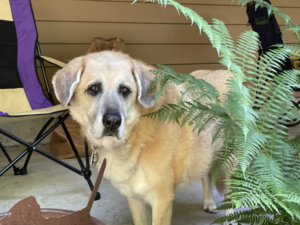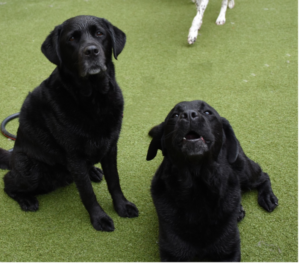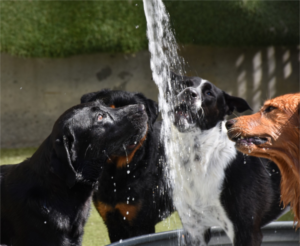Why Doesn’t Your Dog Chew His Food?
When you love and take care of your dog, your dog takes care of your heart.” – The Logical Dog
 If your dog isn’t chewing his food, does that concern you?
If your dog isn’t chewing his food, does that concern you?
As a dog owner, you’ve likely observed a variety of eating habits in your furry friend. One puzzling behavior that can raise concern is when your dog seems to inhale his food without chewing.
This habit can lead to potential health issues and discomfort for your pet. Understanding why your dog isn’t chewing its food is the first step in addressing this behavior effectively…
Reasons your dog may not be chewing…
Natural Instincts – One of the primary reasons dogs don’t chew their food stems from their natural instincts.
- In the wild, dogs are pack animals that often compete for food. Rapid eating ensures they get enough to eat before another member of the pack steals their share.
- This instinct has carried over to domesticated dogs, even though they no longer face competition at home.
 Breed-Specific Tendencies – Certain breeds are more prone to fast eating and minimal chewing.
Breed-Specific Tendencies – Certain breeds are more prone to fast eating and minimal chewing.
- For example, Labradors and Beagles are known for their over-the-top appetites and tendency to gulp down their food. These breeds have a higher tendency for obesity and other health issues related to overeating.
- Understanding your dog’s breed-specific tendencies can help in tailoring strategies to encourage better eating habits.
Anxiety and Stress – Anxiety and stress can significantly impact a dog’s eating behavior.
- Dogs that feel anxious may eat quickly without chewing as a coping mechanism.
- Changes in their environment, separation anxiety, or the presence of other pets can contribute to this stress.
- Addressing the root cause of anxiety is essential in modifying their eating habits.
Medical Conditions – Several medical conditions can cause a dog to swallow food without chewing.
- Dental problems, such as broken teeth, gum disease, or oral pain, can make chewing uncomfortable.
- Additionally, gastrointestinal issues might lead a dog to swallow food quickly to avoid prolonged discomfort.
- If you suspect a medical issue, consulting a veterinarian is important for a proper diagnosis and treatment plan.
Overeating and Obesity – Dogs that are overweight or obese may develop a habit of not chewing their food due to an insatiable appetite.
- Overeating can stretch the stomach and alter its normal function, which leads to rapid food consumption.
- Monitoring your dog’s weight and providing portion-controlled meals can help in managing this behavior.
Tips to Encourage Chewing…
 To address the issue of your dog not chewing its food, consider using some of the following strategies:
To address the issue of your dog not chewing its food, consider using some of the following strategies:
- Slow Feeder Bowls: These specially designed bowls have obstacles that make it harder for dogs to gulp down his food. The design encourages slower eating and promotes chewing.
- Puzzle Toys: Interactive toys that dispense food gradually can turn mealtime into a mentally stimulating activity. These toys encourage dogs to work for their food, slowing down the eating process and promoting chewing.
- Hand-Feeding: By hand-feeding your dog small portions at a time, you can help regulate the pace of eating. This method also reinforces a positive bond between you and your pet.
- Smaller, More Frequent Meals: Instead of one or two large meals a day, try feeding your dog smaller, more frequent meals throughout the day. This approach can prevent overeating and encourage slower eating.
- Change his Diet: Some dogs may not chew dry kibble as thoroughly as they should. By mixing wet food with dry kibble or opting for larger kibble sizes can encourage more chewing.
- Training and Behavioral Modification: Positive reinforcement techniques can be used to train your dog to eat more slowly. Reward him for eating calmly and chewing properly.
Understanding why your dog isn’t chewing its food is the beginning to addressing this behavior. Though it may come from natural instincts or breed-specific tendencies, other factors such as anxiety, medical conditions, and overeating can also play a role. Try the practical strategies above and see if you can help your pup develop healthier eating habits.
Be sure to consult with your veterinarian if you thing there may be any underlying health issues.
At BowWow Fun Towne, we offer self-serve grooming, or we can do it for you.
Dogs are our business, and our friends, and we understand how important your dog is to you.
BowWow Fun Towne offers puppy socializing, in home training, and boarding options
We are experts in dog day care, we care about your dogs and take their health and well-being seriously. Our facility features a full size swimming pool for fun and exercise.

Comments are closed.